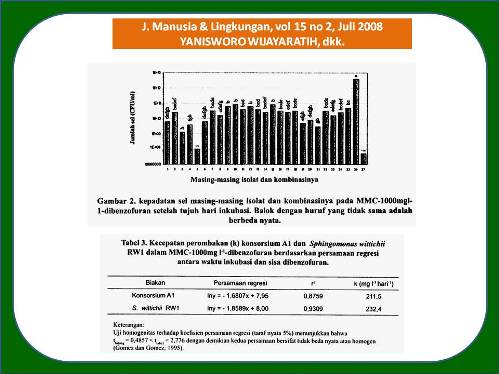
KARAKTERISTIK KONSORSIUM BAKTERI PEROMBAK DIBENZOFURAN DARI SEDIMEN MANGROVE (Dibenzofuran-degrading Bacterial Consortium Characteristics from Mangrove Sediments)
Yanisworo Wijayaratih(1*), Bostang Radjagukguk(2), Erni Martani(3), Irfan D. Prijambodo(4)
(1) Jurusan Ilmu Tanah Fakultas Pertanian, UPN Veteran, Yogyakarta
(2) Fakultas Pertanian, UGM, Yogyakarta
(3) Fakultas Pertanian, UGM, Yogyakarta
(4) Fakultas Pertanian, UGM, Yogyakarta
(*) Corresponding Author
Abstract
ABSTRAK
Dibenzofuran merupakan salah satu senyawa hidrokarbon aromatis polisiklik yang terdiri atas dua cincin benzene yang dihubungkan melalui satu atom oksigen dan satu atom karbon. Dibenzofuran yang mengalami khlorinasi bersifat lebih meracun dari pada senyawa asalnya, dibenzofuran. Penelitian ini bertujuan untuk mendapatkan konsorsium bakteri perombak dibenzofuran dari sediment mangrove serta menyelidiki sifat mikrobiologisnya. Konsorsium dikembangkan dari sediment mangrove menggunakan medium mineral cair yang diperkaya dengan 1000 mg l-1 dibenzofuran sebagai satu-satunya sumber karbon dan energi. Hasil penelitian menunjukkan bahwa konsorsium yang diperoleh mempunyai kemampuan merombak dibenzofuran yang relatif tinggi. Kecepatan perombakan konsorsium terpilih adalah 211,5 mg l-1hari-1. Dari konsorsium terpilih diperoleh lima isolat bakteri. Pertumbuhan konsorsium lebih tinggi dari pada masing-masing isolat atau kombinasinya. Jumlah bakteri dalam konsorsium terpilih mencapai 3,9x1012 CFU ml-1 sedangkan pada masing-masing isolat dan kombinasinya berkisar dari 1,0x108 sampai 7,9x1010 CFU ml-1.
ABSTRACT
Dibenzofuran is a one of polycyclic aromatic hydrocarbon compounds that consists of two benzene rings that are inter connected by one oxygen atom and one carbon. Chlorinated dibenzofuran can be more toxic chemical than the original compound, dibenzofuran. The present study was conducted to obtain the dibenzofuran-degrading bacterial consortium from mangrove sediments and to investigate their microbiological characteristics. The bacterial consortium were developed from mangrove sediments by enrichment liquid minerals medium with 1000 ppm dibenzofuran as the sole source of carbon and energy. The results showed that the consortium had relative high ability to degrade dibenzofuran. The degradation rates of dibenzofuran by the consortium was 211.5 mg l-1 day-1. There were five bacterial isolates in the consortium. The growth of the consortium was higher than that of the individual isolates or their combinations. The number of bacteria in the consortium was 3.9x10 1012 CFU ml-1 where as the number of the individual isolate or their combinations ranging from 1.0x108 to 7.9x1010 CFU ml-1.
Full Text:
Artikel lengkap (PDF) (Bahasa Indonesia)Article Metrics
Refbacks
- There are currently no refbacks.
Copyright (c) 2017 Jurnal Manusia dan Lingkungan







